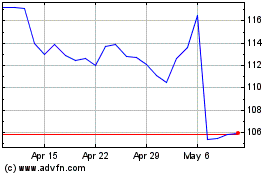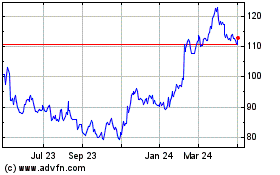By Joe Flint
This article is being republished as part of our daily
reproduction of WSJ.com articles that also appeared in the U.S.
print edition of The Wall Street Journal (December 22, 2017).
21st Century Fox Executive Chairman Rupert Murdoch pushed hard
to persuade regulators two decades ago to allow his media company
to own both a television studio and a broadcast network. Now he's
abandoning the strategy as Fox's rivals have come to embrace
it.
Mr. Murdoch's decision to sell the Twentieth Century Fox studio
to Walt Disney Co., among other assets, while retaining the Fox
broadcast network, has raised fears in Hollywood about the media
company's commitment to entertainment programming, and created
uncertainty about the network's stability and future.
The proposed $52.4 billion deal with Disney comes as Fox is
entering the TV "pilot" season, when new shows are being developed
for the next season. This year, the network is under added pressure
to find new hits after a prolonged ratings slump.
"Fox Broadcasting is a big unknown right now so, as a producer
with a new show about to debut there, that's a concern," said Steve
Levitan, the co-creator of ABC's "Modern Family" who has a new
sitcom called "LA to Vegas" premiering on Fox next month. "Will
they remain a buyer of big, quality dramas and comedies that bring
in the types of viewers who will watch our show? I certainly hope
so."
Landing talent could also be more difficult. One veteran show
producer said if the choice of where to put an actor in a pilot
came down to CBS and Fox, it is now an easier call.
Fox's prime time entertainment programming is averaging 4.6
million viewers in the TV season that began in September, through
early December, a decline of 8% from the same period a year ago,
according to Nielsen. It is second in the coveted demographic of
adults aged 18-49 if sports are included.
Besides the Fox channel, Fox Broadcasting includes 28 local
television stations whose revenue makes the network profitable.
Fox is banking on several mid-season shows to boost its ratings.
In addition to "LA to Vegas," a show about the crew and passengers
who fly the LA-Vegas route, the network has a new police drama
called "9-1-1" from acclaimed producer Ryan Murphy, the return of
the cult hit "The X-Files" and a new musical talent show called
"The Four."
When Mr. Murdoch was building out the Fox network in the early
1990s, he persuaded the Federal Communications Commission to allow
his company to own both a network and a sister production studio to
supply it with shows.
The logic of having a studio and network together, as all of
Fox's major rivals do, is arguably even greater now. Networks rely
on their in-house studios for content, and the arrangement makes it
easier for them to negotiate rights to their shows -- so they can,
for example, offer past episodes in an app. That makes the decision
to split up the Twentieth Century Fox studio, which Disney is
buying, and Fox especially unusual.
On a call with analysts last Thursday, Mr. Murdoch offered few
specifics about the future of Fox Broadcasting beyond saying it
would continue to make its own shows and acquire content from
independent studios.
"People like Warner Bros. and Sony will be looking to us to buy
our programs. So I think we're in a strong position for buying --
for getting all the programs we need," Mr. Murdoch said.
A spokesman for 21st Century Fox declined to comment. 21st
Century Fox and Wall Street Journal-parent News Corp share common
ownership.
"There are independent studios out there more than happy to sell
to a network that has really broad reach and is an outstanding
platform to get awareness for their content," said Peter Liguori a
former senior Fox TV executive and former Tribune Media Chief
Executive.
Still, some observers question just how committed 21st Century
Fox will be to broadcast television after the deal closes.
"Rupert Murdoch is the ultimate pragmatist. If he believed that
broadcast television was a growth business, he would have never
parted with the studio," said Sandy Grushow, a former chairman of
Fox Entertainment and now chief executive of Phase Two Media, an
investment and advisory firm.
Disney would be unable to acquire the Fox network because
federal regulations bar one company from owning two major broadcast
networks.
Some aspects of the Fox network's economics could get more
challenging as a standalone entity. Long-running shows such as "The
Simpsons" and "Family Guy" have become very expensive -- they cost
between $4 million and $5 million per episode, according to an
executive familiar with the matter. If a sister studio isn't
benefiting from keeping those shows on the air then the cost may be
hard to justify.
One possibility, former Fox executives said, is that a leaner
Fox will rely on more unscripted, sports and news content instead
of scripted entertainment programming, which is more expensive.
Inside Fox Broadcasting, the general mood is one of anxiety and
sadness, according to several company employees. The parent company
held multiple town-hall meetings at the Darryl F. Zanuck theater on
the Century City lot in Los Angeles late last week to discuss the
ramifications of the Disney deal. However, they didn't discuss the
fate of Fox in any detail. Senior management said they knew little
about the Disney deal, attendees said.
There are also questions about which executives will be steering
the ship once the Disney deal closes. Fox Networks Group Chairman
Peter Rice, along with executives Dana Walden and Gary Newman who
oversee the Fox network and 20th Century Fox Television studio,
could end up at Disney or strike out on their own.
Mr. Rice, who oversees a TV unit that includes the broadcast
network, compared the deal to an "earthquake" and told attendees
that the company was "processing" what it means. "Thirty years ago
I would have taken a bet from anyone that I would leave the company
before Rupert sold it."
Write to Joe Flint at joe.flint@wsj.com
(END) Dow Jones Newswires
December 22, 2017 02:47 ET (07:47 GMT)
Copyright (c) 2017 Dow Jones & Company, Inc.
Walt Disney (NYSE:DIS)
Historical Stock Chart
From Mar 2024 to Apr 2024

Walt Disney (NYSE:DIS)
Historical Stock Chart
From Apr 2023 to Apr 2024
